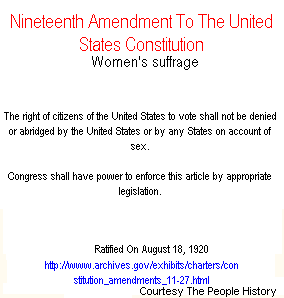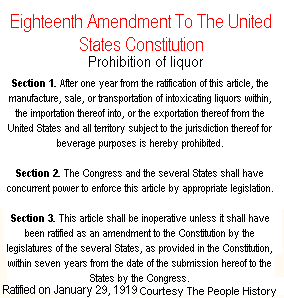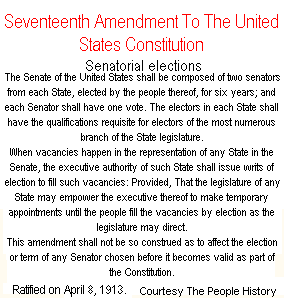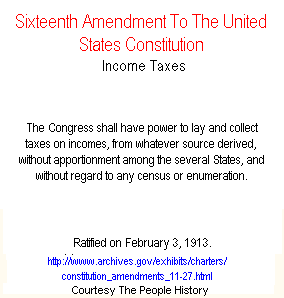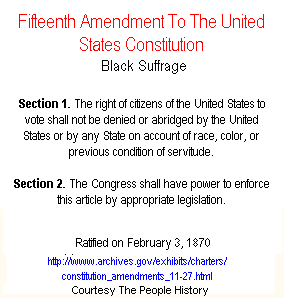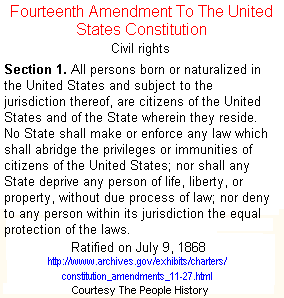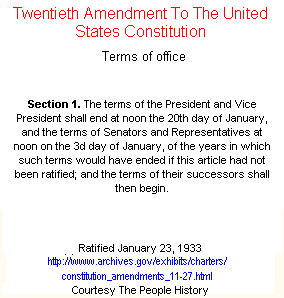
Okay, another long one here, so I'll keep the picture spam to a minimum. This amendment essentially sets the days that the president, vice president, and congress begin their terms. Originally, there had been a four-month lapse to allow for travel time to the capital, but as technology evolved (like cars/planes) this lapse was no longer necessary, and did more harm than good when there were pressing issues that needed immediate attention (i.e.-the great depression). You can find the full text here: http://www.usconstitution.net/const.html
Article:
XX Amendment to the Constitution
The 20th Amendment to the Constitution of the United States is also called the Lame Duck Amendment, because it put a stop to "lame duck" sessions of Congress by advancing the dates for the President's inauguration to January 20 from March 4th, and the date for Congress to convene to January 3rd from march 4th. This avoided the time in office with diminished power.
Purpose of the Amendment
The Senate Committee on the Judiciary said in part:
''[W]hen our Constitution was adopted there was some reason for such a long intervention of time between the election and the actual commencement of work by the new Congress. . . . Under present conditions [of communication and transportation] the result of elections is known all over the country within a few hours after the polls close, and the Capital City is within a few days' travel of the remotest portions of the country. . . .
''Another effect of the amendment would be to abolish the so- called short session of Congress. . . . Every other year, under our Constitution, the terms of Members of the House and one-third of the Members of the Senate expire on the 4th day of March. . . . Experience has shown that this brings about a very undesirable legislative condition. It is a physical impossibility during such a short session for Congress to give attention to much general legislation for the reason that it requires practically all of the time to dispose of the regular appropriation bills. . . . The result is a congested condition that brings about either no legislation or illy considered legislation. . . .
''If it should happen that in the general election in November in presidential years no candidate for President had received a majority of all the electoral votes, the election of a President would then be thrown into the House of Representatives and the memberships of the House of Representatives called upon to elect a President would be the old Congress and not the new one just elected by the people. It might easily happen that the Members of the House of Representative, upon whom devolved the solemn duty of electing a Chief Magistrate for 4 years, had themselves been repudiated at the election that had just occurred, and the country would be confronted with the fact that a repudiated House, defeated by the people themselves at the general election, would still have the power to elect a President who would be in control of the country for the next 4 years. It is quite apparent that such a power ought not to exist, and that the people having expressed themselves at the ballot box should through the Representatives then selected, be able to select the President for the ensuing term. . . .
''The question is sometimes asked, Why is an amendment to the Constitution necessary to bring about this desirable change? The Constitution [before this amendment] does not provide the date when the terms of Senators and Representatives shall begin. It does fix the term of Senators at 6 years and of Members of the House of Representatives at 2 years. The commencement of the terms of the first President and Vice President and of Senators and Representatives composing the First Congress was fixed by an act of [the Continental] Congress adopted September 13, 1788, and that act provided 'that the first Wednesday in March next to be the time for commencing proceedings under the Constitution.' It happened that the first Wednesday in March was the 4th day of March, and hence the terms of the President and Vice President and Members of Congress began on the 4th day of March. Since the Constitution provides that the term of Senators shall be 6 years and the term of Members of the House of Representatives 2 years, it follows that this change cannot be made without changing the terms of office of Senators and Representatives, which would in effect be a change of the Constitution. By another act (the act of March 1, 1792) Congress provided that the terms of President and Vice President should commence on the 4th day of March after their election. It seems clear, therefore, that an amendment to the Constitution is necessary to give relief from existing conditions.''
As thus stated, the exact term of the President and Vice President was fixed by the Constitution, Art. II, Sec. 1, cl. 1, at 4 years, and became actually effective, by resolution of the Continental Congress, on the 4th of March 1789. Since this amendment was declared adopted on February 6, 1933, Sec. 1 in effect shortened, by the interval between January 20 and March 4, 1937, the terms of the President and Vice President elected in 1932.
Similarly, it shortened, by the intervals between January 3 and March 4, the terms of Senators elected for terms ending March 4, 1935, 1937, and 1939; and thus temporarily modified the Seventeenth Amendment, fixing the terms of Senators at 6 years. It also shortened the terms of Representatives elected to the Seventy-third Congress, by the interval between January 3 and March 4, 1935, and temporarily modified Article I, Sec. 2, clause 1, fixing the terms of Representatives at 2 years.
Section 1 further modifies the Twelfth Amendment in its reference to March 4 as the date by which the House must exercise its choice of a President.
Section 2 supersedes clause 2 of Sec. 4 of Article I. The setting of an exact hour for meeting constitutes a recognition of the long practice of Congress, which in 1867 was for the first time enacted into permanent law, 2 only to be repealed in 1871.
When the 3d of January fell on Sunday (in 1937), Congress did by law appoint a different day for its assemblage.
Pursuant to the authority conferred upon it by Sec. 3 of this amendment, Congress shaped the Presidential Succession Act of 1948 5 to meet the situation which would arise from the failure of both President elect and Vice President elect to qualify on or before the time fixed for the beginning of the new Presidential term.
Source: Senate
Purpose of the Amendment
The Senate Committee on the Judiciary said in part:
''[W]hen our Constitution was adopted there was some reason for such a long intervention of time between the election and the actual commencement of work by the new Congress. . . . Under present conditions [of communication and transportation] the result of elections is known all over the country within a few hours after the polls close, and the Capital City is within a few days' travel of the remotest portions of the country. . . .
''Another effect of the amendment would be to abolish the so- called short session of Congress. . . . Every other year, under our Constitution, the terms of Members of the House and one-third of the Members of the Senate expire on the 4th day of March. . . . Experience has shown that this brings about a very undesirable legislative condition. It is a physical impossibility during such a short session for Congress to give attention to much general legislation for the reason that it requires practically all of the time to dispose of the regular appropriation bills. . . . The result is a congested condition that brings about either no legislation or illy considered legislation. . . .
''If it should happen that in the general election in November in presidential years no candidate for President had received a majority of all the electoral votes, the election of a President would then be thrown into the House of Representatives and the memberships of the House of Representatives called upon to elect a President would be the old Congress and not the new one just elected by the people. It might easily happen that the Members of the House of Representative, upon whom devolved the solemn duty of electing a Chief Magistrate for 4 years, had themselves been repudiated at the election that had just occurred, and the country would be confronted with the fact that a repudiated House, defeated by the people themselves at the general election, would still have the power to elect a President who would be in control of the country for the next 4 years. It is quite apparent that such a power ought not to exist, and that the people having expressed themselves at the ballot box should through the Representatives then selected, be able to select the President for the ensuing term. . . .
''The question is sometimes asked, Why is an amendment to the Constitution necessary to bring about this desirable change? The Constitution [before this amendment] does not provide the date when the terms of Senators and Representatives shall begin. It does fix the term of Senators at 6 years and of Members of the House of Representatives at 2 years. The commencement of the terms of the first President and Vice President and of Senators and Representatives composing the First Congress was fixed by an act of [the Continental] Congress adopted September 13, 1788, and that act provided 'that the first Wednesday in March next to be the time for commencing proceedings under the Constitution.' It happened that the first Wednesday in March was the 4th day of March, and hence the terms of the President and Vice President and Members of Congress began on the 4th day of March. Since the Constitution provides that the term of Senators shall be 6 years and the term of Members of the House of Representatives 2 years, it follows that this change cannot be made without changing the terms of office of Senators and Representatives, which would in effect be a change of the Constitution. By another act (the act of March 1, 1792) Congress provided that the terms of President and Vice President should commence on the 4th day of March after their election. It seems clear, therefore, that an amendment to the Constitution is necessary to give relief from existing conditions.''
As thus stated, the exact term of the President and Vice President was fixed by the Constitution, Art. II, Sec. 1, cl. 1, at 4 years, and became actually effective, by resolution of the Continental Congress, on the 4th of March 1789. Since this amendment was declared adopted on February 6, 1933, Sec. 1 in effect shortened, by the interval between January 20 and March 4, 1937, the terms of the President and Vice President elected in 1932.
Similarly, it shortened, by the intervals between January 3 and March 4, the terms of Senators elected for terms ending March 4, 1935, 1937, and 1939; and thus temporarily modified the Seventeenth Amendment, fixing the terms of Senators at 6 years. It also shortened the terms of Representatives elected to the Seventy-third Congress, by the interval between January 3 and March 4, 1935, and temporarily modified Article I, Sec. 2, clause 1, fixing the terms of Representatives at 2 years.
Section 1 further modifies the Twelfth Amendment in its reference to March 4 as the date by which the House must exercise its choice of a President.
Section 2 supersedes clause 2 of Sec. 4 of Article I. The setting of an exact hour for meeting constitutes a recognition of the long practice of Congress, which in 1867 was for the first time enacted into permanent law, 2 only to be repealed in 1871.
When the 3d of January fell on Sunday (in 1937), Congress did by law appoint a different day for its assemblage.
Pursuant to the authority conferred upon it by Sec. 3 of this amendment, Congress shaped the Presidential Succession Act of 1948 5 to meet the situation which would arise from the failure of both President elect and Vice President elect to qualify on or before the time fixed for the beginning of the new Presidential term.
Source: Senate
Response:
This article gives a little more depth as to why exactly the 20th amendment was necessary in the first place. It also points out a few of the problems that lame duck sessions brought about. The one that caught my eye the most was the illy considered legislation. I don't like the idea of legislation being rushed at all-especially when it could have to do with laws that affect me directly.
Article:
Response:
This article was a bit of an eye opener to me. It would seem that lame duck sessions of congress are still an issue, despite the fact that the 20th amendment was supposed to put an end to them. Yet, our sessions of congress continue to have them and make some of their most important decisions during these rushed sessions. It would seem that the problem still exists and is getting quite a bit of attention. Personally, I think they should be done away with for good.
